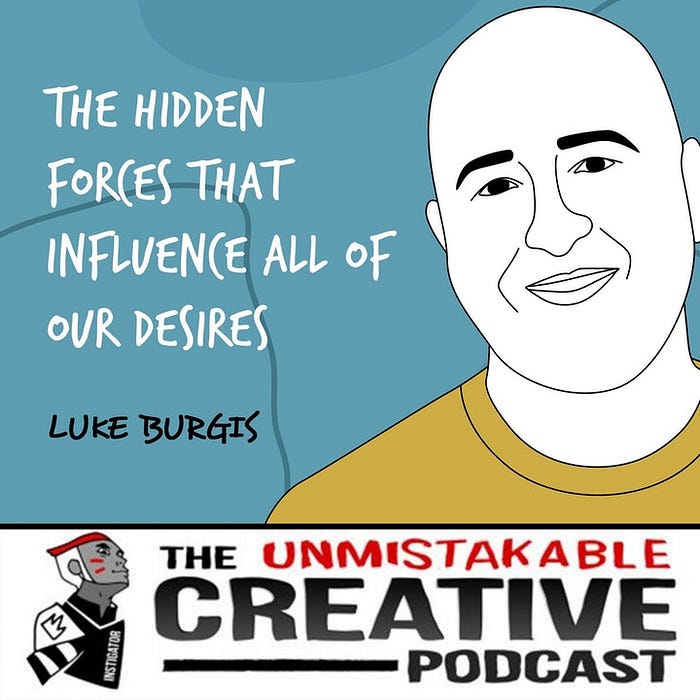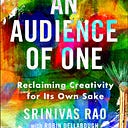Mimetic Desire: The Hidden Force That Influences Everything in Our Lives

Luke Burgis is an entrepreneur, professor, and author of Wanting: The Power of Memetic Desire in Everyday Life. He worked as an investment banker and has successfully built and sold several businesses.
However, regardless of what he accomplished as an entrepreneur, he found that he was extremely unhappy and wanted to understand why. In this exclusive interview, he explains how models of desire shape our values and behavior, and how mimetic desire affects everything in our lives — from the goals we set to the partners we choose.
Mimetic Desire and Mimetic Theory

According to Luke, “Most people are not fully responsible for choosing their own goals. People pursue the goals that are offered to them in their desire system. The point of mimetic theory is that our desire is determined not only by our values but also by the world we experience and observe.
Desire is fundamentally mimetic and, contrary to popular belief, our desires do not arise entirely spontaneously. Even if we think they are, our desires, especially if they are more abstract, are socially generated and shaped by models of desire. -Luke Burgis
For example, we look to other people to help us. No. what we want and what we aspire to and that we never decide autonomously about these things.
As much as we would like to believe that it is not, Our independent nature is a fabric of our imagination. We are all under the influence of others because we live in an interdependent world. Our social conditioning comes from parents, peers, media, and society. And we are not as original or independent as we think we are.
Social Media, The internet, and Self-improvement are Breeding Grounds for Mimetic desire

Mimetic desire is an inevitable byproduct of a world where the highlights of everyone’s lives are on public display.
We need to separate the content from the almost metaphysical trance that certain people or communities can put us in, to which we attach far more importance than we should. So it’s about filtering things. Like filtering out the good. We have to be able to recognize bullshit when we see it, and we have to really consume it consciously.
If you do not consume consciously, it can lead to you making choices that are not in alignment with your long-term goals and do not lead to lasting fulfillment.
Just because someone is successful or famous on the internet does not mean you should take their advice as gospel. What is great advice to one person may be complete bullshit to you.
Do not ignore the context of advice and check people’s credibility before following their advice. If you get caught up in the ego-driven pursuit of a life that looks good on the internet, it can come at the expense of a life that actually is.
Models of Desire

Models of desire are the centers of gravity of our lives: We all have models we look up to and admire. These models shape every aspect of our lives more than we realize. They show us that something is possible and we desire that possibility for ourselves.
Models of desire shape our wants and needs: Throughout our lives, we are exposed to models of desire. For example, if you are a child, the rich kid with the nicer shoes is your model of desire. He has something you do not have but want a nicer pair of shoes. In adult life, we experience a more drastic version of this.
Models of desire have an outsized influence on our lives: Whether it’s influencers on social media or people we admire, these models influence our values, norms, and the most important decision we ever make.
How to find lasting happiness in a world of mimetic desire

Whether you win the lottery, write a New York Times bestseller, or win a Nobel Prize, you are successful by the standards of others and measure your life by their standards. And the way you measure your life will have a profound impact on your happiness and well-being.
1. Use Objective Criteria for Your Goals and Desires.

Mimetic desire is not necessarily a bad thing if you choose rewards that do not conflict with your long-term goals and have objective criteria for your goals.
When we convince ourselves that we are making our choices or pursuing our goals or desires based on purely objective criteria, we are in fact probably being influenced by some hidden models of desire.- Luke Burgis
We need to set goals in order to move forward in our lives. But we pay more attention to setting our goals than to why we chose them when it should be the other way around.
We hear a lot about goal setting, but hardly anything about why we are so obsessed with goal setting in the first place. Many of us relentlessly pursue goals — which we take for granted as good — without pausing to ask ourselves whether we should. (Goal-Setting Doesn’t Work. Here’s What Does)
When you set a goal, ask yourself the following questions:
1. Why do I want to achieve this goal?
2. What will it do for me if I achieve it?
3. Am I trying to impress someone else or seeking validation from strangers online?
Whether you achieve your goal or fail, the only person who has to live with the consequences of your decisions is you.
2. Choose Realistic Models of Desire

We compete for power, status, prestige, or whatever. We can get caught up in these ridiculous games where we lose sight of what we actually want. Because the problem with powerful role models is that they can become larger than life and we fixate on them, which stunts our own growth and development. -Luke Burgis
You probably won’t be the next Steve Jobs, Oprah, or Beyonce, because outliers are terrible role models for most of us. There are so many hidden variables in all their stories that you can not relate to by reading books about them If you have realistic models of possibility, you are much more likely to set goals that you can actually achieve.
3. Identify Past Experiences that Were Fulfilling.

What Luke Burgis calls a fulfillment story in his book consists of three essential elements:
1. It’s an action.
2. You believe you did it well.
3. It gave you a sense of accomplishment.
Pay attention to what you find engaging. Recall moments in your life when what you did led to deep states of flow.
4. Focus on others

The paradox of self-improvement is that the less I care about myself and the more I care about the people I love, the better things go. — Luke Burgis
Because of the internet and social media, so many of us have become self-obsessed without realizing what it’s doing to us. Measuring vanity metrics is an aberration and people who obsessively measure followers, fans, likes, and other meaningless metrics forget that building an audience is not about what you want.
Whether you want someone to read your writing, listen to your podcast, download your app, or buy your products, it’s about adding value to others and helping them solve their problems. In the words of Zig Ziglar, you can get anything you want if you help other people get what they want.
Want More Amazing Stories from Insanely Interesting People?
Subscribe to the Unmistakable Creative Podcast. Just click here.
